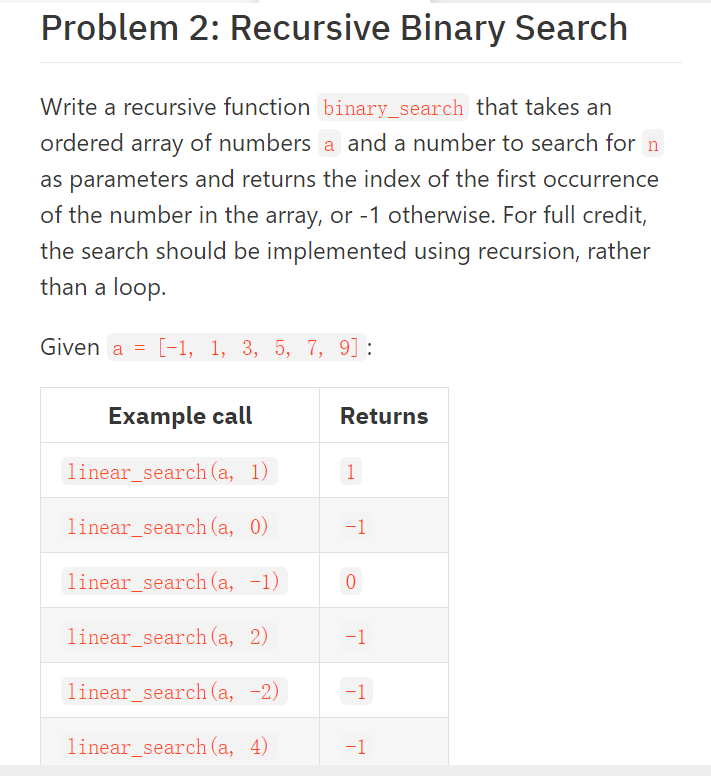Question

Asked By EnchantedMoonlight99 at
Answered By Expert
Jeremy
Expert · 2.6k answers · 2k people helped
Hello, please find below the Python code for modified binary_search.py with search implemented in recursion.
def binary_search(array, num):
return search(array, num, 0, len(array) - 1)
"""
search method implemented with recursion
"""
def search(array, num, min, max):
if max >= min:
mid = (min + max) // 2
if array[mid] == num:
return mid
elif array[mid] > num:
return search(array, num, min, mid - 1)
else:
return search(array, num, mid + 1, max)
else:
return -1
def main():
a = [i for i in range(-1, 10, 2)]
print(a)
for n in [1,0,-1,2,-2,4,5,6,7,-67,134]:
print("%5d index? %d" % (n, binary_search(a,n)))
main()
Just copy search method from above code, everything else is same.
Output Screengrab showing our search method is working fine with recursion :
![[-1, 1, 3, 5, 7, 9]\n1 index? 1\n0 index? -1\n-l index? 0\n2 index? -\n-2 index? -\n4 index? -1\n5 index? 3\n6 index? -1\n7 index? 4\n-](https://media1.cheggcdn.com/coop/1b6/1b67c2b0-1221-4db0-a25a-29613b3d96a9/1619371106655_image.png?u=620154ae-c31b-418d-a3c1-c9bf47bb0b48&q=b5346ab2-6982-4ab1-a14b-aac41c47c3fb&context=gdg-qna-dgs&Policy=eyJTdGF0ZW1lbnQiOlt7IlJlc291cmNlIjoiaHR0cHM6Ly9tZWRpYTEuY2hlZ2djZG4uY29tL2Nvb3AvMWI2LzFiNjdjMmIwLTEyMjEtNGRiMC1hMjVhLTI5NjEzYjNkOTZhOS8xNjE5MzcxMTA2NjU1X2ltYWdlLnBuZz91PTYyMDE1NGFlLWMzMWItNDE4ZC1hM2MxLWM5YmY0N2JiMGI0OCZxPWI1MzQ2YWIyLTY5ODItNGFiMS1hMTRiLWFhYzQxYzQ3YzNmYiZjb250ZXh0PWdkZy1xbmEtZGdzIiwiQ29uZGl0aW9uIjp7IkRhdGVMZXNzVGhhbiI6eyJBV1M6RXBvY2hUaW1lIjoxNzA1NjgxOTA1fSwiRGF0ZUdyZWF0ZXJUaGFuIjp7IkFXUzpFcG9jaFRpbWUiOjE3MDU2Nzk4MDV9fX1dfQ__&Key-Pair-Id=K1M1OMQ09SPKJC&Signature=lFz8cxn3ETWtwwtT2gUdxZskBLCZ23sMxHu8gttEgHWjcdPTspbxIUxrFrComlPL9WHk6iqcD-8l6lPK15o4SjCzSlWofGiy2qfmAe~ERLVG1-yKXsoEkpSaCBYMF5W2Jtpt3d~XJYaHfOq0LfwO00ymWRpFqN6FLD0vrrPPxFTSYnGxzKE-P0zFzSwIkmKrx32-ZN2i70dJIHZOVu1DGKCVG2Ld-4rFAkjJS~N8BNpCGwlCq2py4d6fVPSjbdY1QiPSsQ-Wc0nNqwOC7MRJx~pFD5Ad7BH6CvFm6unyvJEOYTeen~ngfrEhyc7MAt8wFwEfq1gtMo-P3usDRh3Kyg__)
If you have any doubt, let me know in comments. If not, please upvote the answer.
Thanks, Happy Learning!
🧑🏫 More Questions
👉 Interested in exploring further?
Chrome Extension
1. Search answers from our 90+ million questions database.
2. Get instantly AI Solutions powered by most advanced models like GPT-4, Bard, Math GPT, etc.
3. Enjoy one-stop access to millions of textbook solutions.
4. Chat with 50+ AI study mates to get personalized course studies.
5. Ask your questions simply with texts or screenshots everywhere.